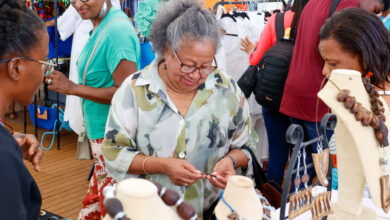(CARICOM Secretarait, Turkeyen, Greater Georgetown, Guyana) Secretary-General of the Caribbean Community (CARICOM), Ambassador Irwin LaRocque, on Monday lauded the sterling work of the Caribbean Animal Health Network (CaribVET) but cautioned against complacency in the fight against animal health diseases in the Community.
Addressing delegates at the Seventh Meeting of CaribVET’s Steering Committee now underway at the Princess International Hotel, Providence, Guyana, the Secretary-General alluded to the global recognition of the increased risk of animal diseases that impacted on food supply in the Region and underscored the critical nature of monitoring those diseases.
While globalization, trade, animal and human movements heightened the risk of disease circulation, the Secretary-General pointed out that in spite of some factors, including resource and capacity constraints, the movement of people through air and sea travel, the Caribbean remained relatively free of severe incidences of, or recurring animal diseases.
“But, we must not become complacent. We must design policies and strategies to strengthen and safeguard our relatively good animal disease status in the Caribbean, especially in the face of the worrying prognosis of a major disease burden. Forecasting models predict that an outbreak of disease could affect between 25-30 per cent of the population with potentially enormous economic costs worldwide, particularly in the poorest countries where resources for surveillance and health care are limited and population health and nutritional status are also poor,” he said.
Underlining the critical role of CaribVET, Ambassador LaRocque said that a regional approach to monitoring and building skills in surveillance and control of animal diseases in the Caribbean was essential.
The Secretary-General provided assurance of the Secretariat’s support to the Network and committed to engaging CaribVET on policy formulation, technical advice, and capacity-building initiatives under the Animal Health Components of the Community’s Agriculture Programme.
Ambassador LaRocque announced that some US$13M would be spent on Sanitary and Phyto-Sanitary (SPS) activities in the Caribbean Forum of African, Caribbean and Pacific States (CARIFORUM) and that CaribVET’s involvement in this regard was expected to focus on building capacity in epidemiology and laboratory quality assurance, among other areas.
He also identified collaboration between CaribVET and the Caribbean Animal Health and Food Safety Agency (CAHFSA) as another area in which the Network could contribute to the development of the Region. Primarily, he said, CAHFSA – which comes on stream later this year – would collaborate with CaribVET to ensure there was no duplication of efforts. “…much is expected of the Network and I take this opportunity to once again congratulate the Members of the Network for the good work that is being done and to sincerely thank the Government of France, CIRAD, the United States Department of Agriculture (USDA), the Inter-American Institute for Co-operation in Agriculture (IICA) and the United Nations Food and Agriculture Organisation (FAO) for the tremendous technical and financial support they have provided to drive the activities of the Network. I want to say a special thank you to Dr Thierry LeFrancois and his team of specialists at CIRAD in Guadeloupe for their tremendous efforts in managing and organising the activities of the Network,” Ambassador LaRocque said. Dr. LeFrancois, who also spoke at the opening ceremony, acknowledged the support of several organizations and urged members of CaribVET to continue to be proud of “what we have done so far”. “We cannot stop now,” he told the delegates.
Delegates to the three-day meeting are drawn from the Network’s membership of more than 31 countries and territories, ten regional and international organizations, universities and research institutes all working to define regional strategies for animal disease surveillance and control.
Among the matters the Meeting will consider are a review of the organisation’s work over the past year; the revised Charter of the Network; and their programme of work and training activities for animal health in the Caribbean.
CaribVET provides support to veterinary and veterinary public health services in the Caribbean. The main objective of the Network is to improve the regional sanitary situation and to contribute to the harmonization and reinforcement of animal diseases surveillance and control activities in the Caribbean so that trade in animal and animal products can be improved while generally safeguarding animal and human health.





